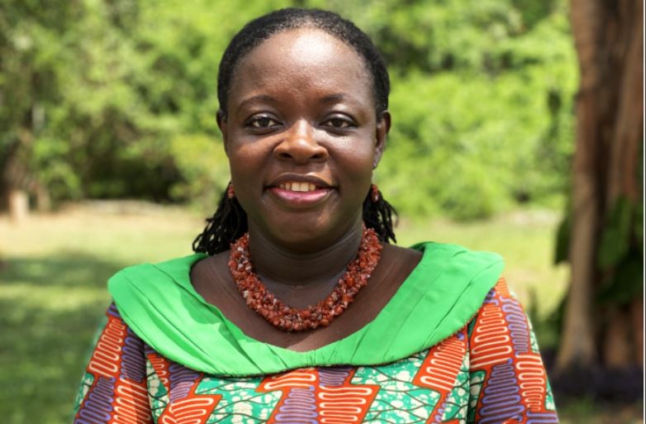The Vice-Chancellor of the University of Ghana, Prof Nana Aba Appiah Amfo says many things encumber women from attaining professional excellence in society.
In an interview with Mail and Guardian's Halima Athumani the academician listed gender roles and societal expectations as some of the impediments.
As a result of these impediments, she believes that females require more attention to overcome the barriers they face in their professional field.
Read the full interview below:
You are the University of Ghana’s first female Vice-Chancellor. What does it take to make it to such a senior position?
It’s a combination of hard work, identifying opportunities and taking advantage of those opportunities, and some favour from God. Because I do believe I’m not the only one who works the hardest — yes, I do work hard, but it’s also important to take advantage of opportunities as they come, because they prepare you for positions ahead.
My parents were teachers: they put a premium on education and they did not discriminate as far as their daughters or sons were concerned. They gave me the opportunity to get educated to the highest level I desired. They brought me up to believe that I can do anything that I wanted to — anything that my brothers could do, I could also do.
What do you bring to the table as Vice-Chancellor, and why is it important to have women in senior positions in science and research?
Coming to this position, I intend to drive the growth of this university through technology and humanism. The past two years have taught us we all need to take technology very seriously and we’ve had experiences of what we can use technology for.
In every aspect of the university’s operations — from research management to teaching and learning, to administrative processes, to student management — I intend that technology drives this. But we should not forget that we’re there for the humans … the university exists for the good of the larger society.
Men have dominated our boardrooms; men have dominated academia. Here in my university, the proportion of women academics, that’s just about 30%. And as you can imagine, the higher you go up the ranks, the fewer women that you find.
But, I must say that it’s a good time at my university, I am the first female vice-chancellor. For the first time too, we have a female chancellor; we also have a female council chair for the first time. It is a source of encouragement to many women out there, but also for men — they dream for themselves, they dream for their wives, their daughters, their sisters.
Your field of expertise is pragmatics, a sub-discipline of linguistics. Can you explain pragmatics?
Pragmatics specifically looks at language use in context. For you to be able to make meaning out of what we say, you almost always need the context. Sometimes you need the history, the religion, the culture; you need the philosophy and so on.
For example, if you have a scientific innovation, which is expected to help farmers increase their yield, how is it that you communicate to that group of farmers who don’t have so much education, such that they appreciate that scientific innovation and how it can enhance their yield?
You’re passionate about supervising young professional women. Why more women and not men; don’t both need mentoring?
Absolutely, both need mentoring and I have mentored both men and women in my career.
What I seek to do is to support women to come out of their shells; to support women to overcome the barriers that prevent them from achieving their highest potential. That’s why I think that women need special attention — we have so much great potential, but there are so many things that encumber us in society: our gender roles, what society expects of us. These tend to hinder us from being professionally excellent.
Latest Stories
-
Ghana-Russia Centre to run Russian language courses in Ghana
5 hours -
The Hidden Costs of Hunger: How food insecurity undermines mental and physical health in the U.S.
5 hours -
18plus4NDC marks 3rd anniversary with victory celebration in Accra
8 hours -
CREMA workshop highlights collaborative efforts to sustain Akata Lagoon
8 hours -
2024/25 Ghana League: Heart of Lions remain top with win over Basake Holy Stars
9 hours -
Black Queens: Nora Hauptle shares cryptic WAFCON preparation message amid future uncertainty
9 hours -
Re-declaration of parliamentary results affront to our democracy – Joyce Bawah
10 hours -
GPL 2024/25: Vision FC score late to deny Young Apostles third home win
10 hours -
Enhancing community initiatives for coastal resilience: Insights from Keta Lagoon Complex Ramsar Site Workshop
10 hours -
Family Health University College earns a Presidential Charter
10 hours -
GPL 2024/25: Bibiani GoldStars beat Nsoatreman to keep title race alive
10 hours -
GPL 2024/25 Bechem United keep title hopes alive with narrow win over FC Samartex
10 hours -
2024/25: Dauda Saaka scores as Asante Kotoko beat Dreams FC
10 hours -
M.anifest reflects on galamsey’s devastation 11 years after ‘No Shortcut to Heaven’
11 hours -
We’ll have the last laugh – Sammy Gyamfi slams EC’s “cantata” re-collation
11 hours

